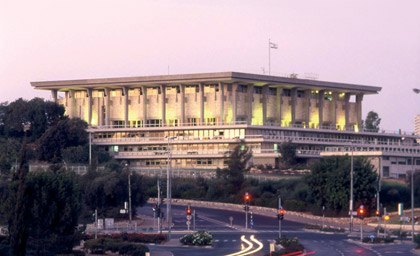
Jerusalem: The Knesset (Israeli parliament), view from the south (Ministry of Tourism)
The Knesset (Israel's unicameral parliament) is the country's legislative body. The Knesset took its name and fixed its membership at 120 from the Knesset Hagedolah (Great Assembly), the representative Jewish council convened in Jerusalem by Ezra and Nehemiah in the 5th century BCE.
A new Knesset begins to function after general elections, which determine its composition. In the first session, Knesset members declare their allegiance, and the Knesset speaker and deputy speakers are elected. The Knesset usually serves for four years, but may dissolve itself or be dissolved by the prime minister any time during its term. Until a new Knesset is formally constituted following elections, full authority remains with the outgoing one.
The Knesset operates in plenary sessions and through 15 standing committees. In plenary sessions, general debates are conducted on legislation submitted by the government or by individual Knesset members, as well as on government policy and activity. Debates are conducted in Hebrew, but members may speak Arabic, as both are official languages. Simultaneous translation is available.
To become law, a regular state bill must pass three readings in the Knesset (while private bills have four readings). In the first reading, the bill is presented to the plenary, followed by a short debate on its contents, after which it is referred to the appropriate Knesset committee for detailed discussion and redrafting, if necessary. When the committee has completed its work, the bill is returned to the plenary for its second reading, at which time committee members who have reservations may present them to the plenary. Following a general debate, each article of the bill is put to a vote and, unless it is necessary to return it again to committee, the third reading takes place immediately, and a vote is taken on the bill as a whole. If the bill passes, it is signed by the presiding speaker and is later published in the Official Gazette, with the signatures of the president, prime minister, Knesset speaker and the minister responsible for the law’s implementation. Finally, the state seal is affixed to it by the minister of justice, and the bill becomes law.